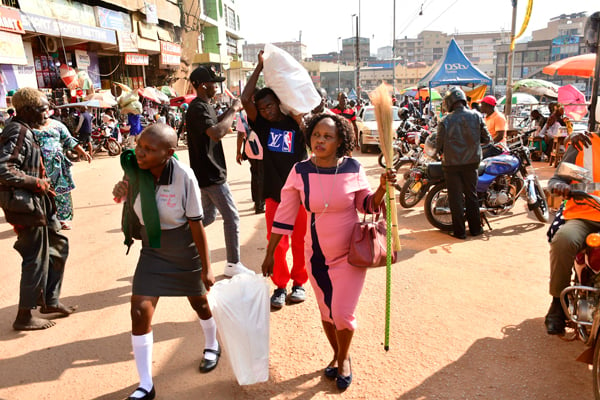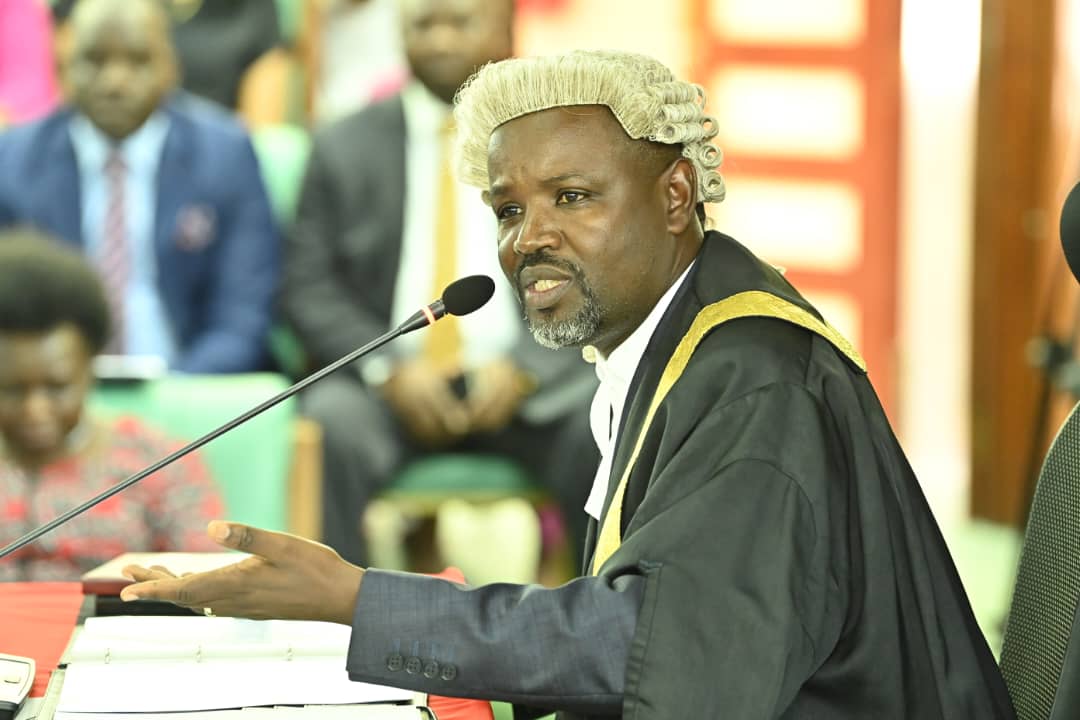Prime
Don’t blame us for high fees, private schools say

A parent takes her child to school in Old Park, Kampala on February 4, 2024. Schools pointed to utility bills and feeding expenses as significant cost drivers. PHOTO/STEPHEN OTAGE
What you need to know:
- The ongoing debate surrounds high school fees, schools defending the costs for perceived value while officials scrutinise additional expenses and advocate for regulation.
Private school administrators have responded to mounting public outcry over what is perceived as unduly high tuition fees, attributing the costs to operational expenses.
Although many administrators declined to provide a detailed breakdown of their expenditure, they pointed to utility bills and feeding expenses as significant cost drivers. However, the lack of transparency regarding expenditure left questions unanswered about profit margins, fueling the ongoing debate over school fees.
Water and electricity bills were identified as major operational costs, but specific figures were not disclosed by schools. We were, however, unable to ascertain exactly how much the schools pay for utilities because they remained cagey with the details.
According to the approved electricity end-user tariffs applicable for the supply of electricity by energy firm, Umeme, for the first quarter of the year set by the Electricity Regulatory Authority, domestic consumers pay Shs797 per unit, while commercial consumers pay on average Shs60.6 per unit of power consumed.
The water tariff for institutions such as hospitals, schools and government establishments is Shs4,274 per cubic metre (1,000 litres) of water drawn.
Mr Pius Mijjuni, the head teacher of St Edward High Day and Boarding School in Kampala, provided insight into the allocation of funds.
At St Edward High, day scholars pay Shs500,000, while those in boarding section pay Shs900,000 per term. With a total population of about 350 students, the school on average collects Shs245 million per term.
According to Mr Mujuni, feeding takes about one third of the total purse, translating into Shs73.5 million. This, he said, is followed by salaries for their 22 teachers and 10 support staff. Each teacher is paid about Shs600,000 per month.
“Children are fed on a balanced diet. Every Sunday, they are fed on rice and chicken while on Thursdays, we feed them on rice and beef. Other days they are fed on posho, potatoes, cassava (katogo), among others,” he added.
Mr Mujuni said students consume 100 kilogrammes of posho and 50 kilogrammes of beans per day (lunch and supper).
On the open market, a kilogramme of beans goes for about Shs4,000, while posho ranges between Shs2,500 and Shs2,800 depending on the season.
Additionally, schools incur expenses on utilities, taxes, internet fees, and laboratory items.
Mr Mujuni said for biology lessons, items such as frogs and rats are bought for practical lessons. The school buys each frog at Shs5,000, while each rat goes for Shs25,000.
Mr John Kabanda, the head teacher of Hillside Junior School in Makindye, acknowledged that feeding costs constitute a significant portion of expenditure but did not provide a detailed breakdown of expenses, claiming this is a new position.
“There are so many things that schools do with this money, but feeding takes a lion’s share. At least 20 percent of this money is spent on food,” Mr Kabanda said.
On the other hand, Mr Joseph Kiggundu, director of Kings Schools, observed that private schools set fees depending on the services and standards offered.
“The schools have a lot of differences in terms of standards of living; how they feed their children, how the children sleep, even the quality of staff that they employ. These variations exist because it’s a business environment. You set the standard and, therefore, the standards determine the cost that you are going to incur. Gone are the days when people were fed on three beans in water and that is sauce,” Mr Kiggundu observed.
He said the least paid teacher in their schools earns Shs1 million monthly.
“When you are a low standard school that means you are not going to incur very heavy costs. When you set the standards quite high, you are going to incur costs,” he added.
At Kings Primary School, one of the institutions under Kings Schools, day scholars pay Shs900,000 while boarding students are charged Shs1.3 million.
However, the Tororo District woman MP, Ms Sarah Achieng Opendi, a vocal advocate for fee regulation, raised concerns about additional expenses imposed on parents.
Ms Opendi highlighted the burden of purchasing textbooks and other materials, questioning the necessity of such quantities.
“You imagine a school where there are 2,000 children. Those are 2,000 brooms every term. Honestly, can these children use 2,000 brooms every term? Can they use 2,000 reams of paper every term? Can they use whatever they are being asked to take every term? The answer is no. So it seems we are also providing materials or items to these school managers who might be having shops somewhere,” she said.
Value for money
However, some parents defended the school fees being charged in some schools, saying there is value for money. One parent, whose child attends Budo Junior School in Wakiso District, paid Shs2,885,400 for first term and praised the quality of education and the conducive learning environment..
“They are taught well, fed on a balanced diet, the dormitories are spacious and we don’t carry mattresses. Besides, security of our children is guaranteed. In fact, there is a police station at the gate of the school,” the parent, who asked not to be named, said.
Another parent who also preferred to remain anonymous, and has a child in Senior Two at Seeta High School, justified the termly fees of Shs2,158,000, emphasizing the school’s role in fostering discipline and providing a conducive environment for learning.
“Apart from the academics, they groom them into disciplined citizens and I think the environment is conducive. The way he behaves and reasons is different from that of children from other schools that I have interacted with,” she said.
In response to the ongoing debate over high school fees, Mr Peter Ogwang, the State minister for Education, urged for calm, assuring that the government is working to address the issue.
He said the ministry would engage all stakeholders to make sure that schools do not charge exorbitantly.
“It is true, we acknowledge that within the Education Act there is a provision for the minister to regulate fees. I did mention when I was closing the Senior One selection exercise, and the minister of Education (Ms Janet Museveni) in her statement did make it clear that as government we will continue to follow up on the issue of increment of fees by these schools,” he said on Tuesday.
MINISTRY OF EDUCATION STATEMENT TO PARLIAMENT ON SCHOOL FEES CHARGES
Rt Hon Speaker, the ministry shares the concern of Hon Members about prohibitive school fees charges which are denying access to education for a number of learners and compromising the government objectives of providing affordable, quality education for all and increasing equitable access to education.
Rt Hon Speaker, it is against this background that the First Lady and Minister of Education and Sports set up the Kayanja Committee in March 2017. The findings and recommendations of the Committee were considered and guidelines issued while taking into consideration the liberalised nature of the economy and the consequent need for government to regulate rather than control levels of fees by designing guidelines, which schools must abide by.
Rt Hon Speaker, from the recommendations that were drawn by the Kayanja Report, the ministry has come up with measures to curb the continuous rising fees charges. These measures were communicated to the schools and the general public through Press Release and a Circular by the Permanent Secretary, Ministry of Education and Sports.
The guidelines in the circular included the following:
1. No school, private or government, shall increase school fees for whatever reason without written authorisation from the Permanent Secretary, Ministry of Education and Sports and/or chief administrative officer/town clerk as the case may be.
2. Other cash and non-cash requirements outside the approved school fees structure are strictly prohibited. All non-cash items must be catered for in the school budget.
3. Schools implementing Universal Primary Education (UPE), Universal Secondary Education (USE) and Universal Post O-Level Education and Training (UPOLET) shall strictly adhere to the policy implementation guidelines, where parents decide and agree to contribute towards an emergency in the school and permission is sought and granted by the Permanent Secretary, no learner shall be excluded from school on account of a parent’s failure to pay the agreed amount in accordance with Section 9(3) of the Education Act 2008. As soon as the emergency is resolved, the school shall stop charging the emergency fund.
4. Where a school board/school management committee has to employ additional teachers to those on payrolls, permission shall be sought from the Permanent Secretary in case of a secondary school and chief administrative officer/town clerk in case of Primary Schools, to use part of the capitation grant towards the payment of the additional teachers.
5. In line with 4 above, head teachers are warned against employing additional teachers before all the teachers on payroll have been assigned the minimum required teaching load. All teachers without a minimum teaching load should be promptly reported to the Ministry of Education and Sports in case of secondary schools or respective Local Governments in case of primary schools for appropriate redeployment.
All schools must respect staff establishment ceilings for both teaching and non-teaching staff as provided by Ministry of Public Service.
6. Private schools must adhere to the approved staff employment guidelines. They should formally recruit, contract and effectively manage and develop staff on reasonable employment terms.
7. All government and government-aided schools should desist from taking commercial loans. Any school applying for a loan must seek authorisation from the Minister of Finance Planning and Economic Development through the Permanent Secretary, Ministry of Education and Sports as provided for in the Public Finance Management Act 2015.
Rt Hon Speaker, these guidelines have been widely circulated to institutions of learning across the country through Local Governments, Kampala City Council Authority and the Directorate of Education Standards.
Rt Hon Speaker, the Ministry of Education and Sports prepared a Cabinet Paper on school fees regulations. However, Cabinet in a quest to fulfil the pledge of free education for all, directed the ministry to submit another memo on compulsory free education for all.
The ministry is embarking on this process and will brief Parliament accordingly on the progress of this at an appropriate time.
Therefore, the policy regulating school fees has, as it were, been overtaken by events and a new position on Universal Education is being explored.
I beg to submit.
Peter Ogwang (MP)
Minister of State for Sports
August 31, 2023




